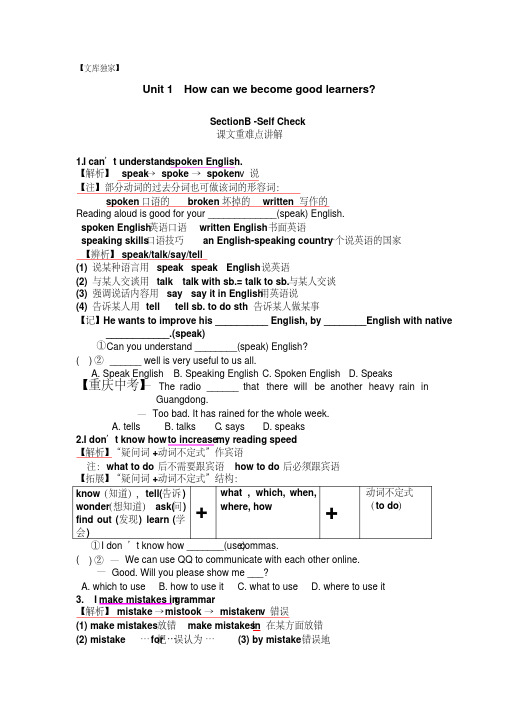spoken English
spoken English

What are you trying to say?(你到底想说什么?)Don't be silly.(别胡闹了。
)How strong are your glasses?(你近视多少度?)Just because.(没有别的原因。
)It isn't the way I hoped it would be.(这不是我所盼望的。
)You will never guess.(你永远猜不到。
)No one could do anything about it.(众人对此束手无措。
)I saw something deeply disturbing.(深感事情不妙。
)Money is a good servant but a bad master.(要做金钱的主人,莫做金钱的奴隶。
)I am not available.(我正忙着)Wisdom in the mind is better than money in the hand.(脑中的知识比手中的金钱更重要)Never say die.it's a piece of cake.别泄气,那只是小菜一碟。
Don't worry.you'll get use to it soon.别担心,很快你就会习惯的。
I konw how you feel.我明白你的感受。
You win some.you lose some.胜败乃兵家常事。
Don't bury your head in the sand.不要逃避现实。
I didn't expect you to such a good job.我没想到你干得这么好。
You are coming alone well.你做得挺顺利。
She is well-build.她的身材真棒。
You look neat and fresh.你看起来很清纯。
You have a beautiful personality.你的气质很好。
Spoken English

口语精选I'm terribly sorry. 我真的很抱歉。
You did a good job. 你做的很好。
Well,I've got to go.See you later. 嗯,我得走了,以后见。
Thank you very much. 非常感谢你。
I know what you mean. 我知道你的意思。
What are you trying to say?你到底想说什么?Don't be silly.(别胡闹了。
)Today is a great day.今天是一个伟大的一天。
Where there is a life,there is a hope.哪里有生命,哪里就有希望。
I am new in this field.我是新的在这一领域。
How strong are your glasses?你近视多少度?Mr.John,haven't seen you for a long time.How have you been?I heard that you took a trip to China for twomonths.How was it?约翰先生,好久没见你了,你过得怎么样?我听说你去中国旅行了两个月了,怎么了?Tell me all about your troubles. 告诉我你的烦恼。
Just because.(没有别的原因。
)It isn't the way I hoped it would be.(这不是我所盼望的。
)You will never guess.(你永远猜不到。
)No one could do anything about it.(众人对此束手无措。
)I saw something deeply disturbing.(深感事情不妙。
)He is a man with a sunny/cheerful disposition.(他是个开朗的人。
2020人教版九年级英语上Unit1课文重难点讲解

【文库独家】Unit 1 How can we become good learners?SectionB -Self Check课文重难点讲解1.I can’t understand spoken English.【解析】speak→spoke →spoken v说【注】部分动词的过去分词也可做该词的形容词:spoken 口语的broken 坏掉的written 写作的Reading aloud is good for your _____________(speak) English.spoken English 英语口语written English 书面英语speaking skills 口语技巧an English-speaking country 一个说英语的国家【辨析】speak/talk/say/tell(1) 说某种语言用speak speak English 说英语(2) 与某人交谈用talk talk with sb.= talk to sb. 与某人交谈(3) 强调说话内容用say say it in English 用英语说(4) 告诉某人用tell tell sb. to do sth 告诉某人做某事【记】He wants to improve his __________ English, by ________English with native ____________.(speak)①Can you understand ________(speak) English?( )②______ well is very useful to us all.A. Speak EnglishB. Speaking EnglishC. Spoken EnglishD. Speaks【重庆中考】—The radio ______ that there will be another heavy rain inGuangdong.—Too bad. It has rained for the whole week.A. tellsB. talksC. saysD. speaks2.I don’t know how to increase my reading speed【解析】“疑问词+动词不定式”作宾语注:what to do 后不需要跟宾语how to do 后必须跟宾语【拓展】“疑问词+动词不定式”结构:know(知道),tell(告诉)wonder(想知道)ask(问) find out (发现) learn (学会) +what , which, when,where, how +动词不定式(to do)①I don’t know how _______(use) commas.( )②—We can use QQ to communicate with each other online.—Good. Will you please show me ___?A. which to useB. how to use itC. what to useD. where to use it3. I make mistakes in grammar【解析】mistake→mistook →mistaken v错误(1) make mistakes 放错make mistakes in在某方面放错(2) mistake …for… 把…误认为… (3) by mistake 错误地。
英语口语考试必要吗?Is a Test of Spoken English Necessary-_英语作文_1

英语口语考试必要吗?Is a Test of Spoken EnglishNecessary?In recent years, spoken English test has become a hot topic amongpeople, especially among students and heated debates are right on their way.近年来,英语口语考试已经成为人们关注的热门话题,尤其是在学生之中,并引发了激烈的辩论。
Some people are in favor of the idea ofspoken English est. they point out the fact that spoken English is a basicskill that every student should master. And test is an effective way to measureour ability. In particularly, oral English test is an important and effectiveway for Chinese students to improve.有些人支持英语口语考试。
他们认为英语口语是每个学生都应该掌握的一项基本技能。
而考试则是一种衡量我们能力的有效途径。
特别地,英语口语考试对于提高中国学生的英语水平更是重要而且有效的办法。
However, other people stand on differentground. They considerthat spoken English test will increase the burden forstudents, especially for the senior high school students. They firmly figureout that test just is a form but could not make a great contribution forlearners’levels in English speaking. In addition, students have to waste muchmore time in preparing the test.然而,有些人则持有不同的观点。
Spoken English(英语口语)

四六级口语例句汇总SpokenEnglish

四六级口语例句汇总Spoken EnglishSpoken English No.1AAny day will do?哪一天都可以?Are you by yourself?你一个人来吗?All right with you?你没有问题吧?All systems are go. 都准备好了(注:无语法错误) Are you free tomorrow?明天有空吗?Are you kidding me?你在跟我开玩笑吧?As soon as possible!尽可能快!Absence makes the heart grow fonder.小别胜新婚。
距离产生美After you.您先。
Allow me.让我来。
Any messages for me? 有我的留言吗?Anything else? 还要别的吗?Any urgent thing?有急事吗?Are you sure? 你肯定吗?BBack in a moment!马上回来!Believe it or not!信不信由你!Better luck next time!下次会更好!Be careful! 注意!Be quiet! 安静点!Between us. 你知,我知。
Beauty is in the eye of the beholder.情人眼里出西施Big mouth! 多嘴驴!Birds of a feather flock together.物以类聚,人以群分Blast! 妈的!Bless you! 祝福你!Boy will be boys本性难移!男孩就是男孩!Bottle it! 闭嘴!Bottoms up! 干杯(见底)!Boy! (表示惊奇,兴奋等)哇!好家伙!Break the rules. 违反规则。
CCan I have this. 可以给我这个吗?Come to the point!有话直说!Can I help you? 我能帮你吗?Can you dig it?你搞明白了吗?Can-do. 能人。
How to Learn Spoken English
How to Learn Spoken English0.PrefaceAs we know, spoken English is used more and more widely in modern society as an important means of communication. We often faced situations where much depends on our abilities of speaking and listening. Many people knowingly try to improve their spoken abilities.In fact, speaking is different language ability than listening, reading or writing. Each one out of tree can be done separately. One is be able to write but not speak alone, for instance. However every learner hopes that he finally will be able to speak fluently and accurately, but not each of them can achieve this aim. Besides the differences of character, habit and system of nerve, many people complain that in the adverse circumstance of study, such as no chance of communicating with native speaker, lack of scene, without appropriate topic, shortage of proper teacher etc. As a matter of fact, language exercise is one thing of yourself. As long as you work hard with appropriate method, you can talk to others with perfect English.Ⅰ. The philological factors to spoken EnglishThere are many factors relevant to learn spoken English. Dr. Sun Hong of Xi‟an thinks the main philological factors of spoken English are psychology, phonetics, lexicology and different culture.1. The factor of psychology. English learners of our country usually have a general problem. That is the fear of speaking English. On the one hand, it is a result of stage fright. On the other hand, it is caused by mistake anxiety.2. The factor of phonetics. Many people can try to speak English, and they have quiet good base of English. But they are also very difficult to communicate with others. Other people can hardly understand what they said. This phenomenon is caused mainly by all kinds of pronunciation mistakes, understandable tone and dialect etc.3. The factor of lexicology. Some learners only say some cliché every time when they try to have a conversation with someone. They can‟t express what they want to say. So they feel very awkward. In order to speak with fervor and assurance, learners must study all kinds of vocabulary, especially idiom, proverb, humor phrases, new words, abbreviations etc.4. The factor of different culture. Many people can‟t use words and phrases properly. This makes many jokes. The others can understand every word what they heard, but they can‟t understand the whole means. This has much to do with the unfamiliarity of English and American culture.So English learner must work hard in these factors.Ⅱ.Have a good and correct attitude to spoken English study.Everyone knows that the only really effective way to improve on language skills is to use the language. In reality, however, we know that there are many reasons why people don‟t want to speak in another language—they are afraid of making mistakes, they can’t express their real meaning easily, they are shy, they are afraid people will laugh at them. We all feel this way some of the time. Now let‟s read a story.One of English teacher at a university got into a taxi one day, and as she talked with the driver, she noticed with a great surprise that he had very good spoken English, better, in fact, than that of some her student! “Where did you learn your English?” she asked. “Oh,” he replied, “I never went to secondary school. I drive a taxi e very day, but while I‟m driving around, I listen to the English radio stations. And if an English-speaking passenger gets in, I will try to start a conversation with them. That‟s how I learn my English!”There are many things that contribute to good spoken English, but an important question for you isthis: to what extent are your attitudes similar to those of taxi driver? Are you willing to try to start a conversation with an English speaker? Or do you know unless you try to speak English your tongue won‟t behave itself and you can hardly make a sound? If you really want to improve your spoken English, correct your attitude firstly and get rid of your worry about speaking.Ⅲ.How to speak more fluently?Many experts hold an opinion that English learners should speak fluently at first, and then pursue accuracy of language. So linguists suggest some specific things everyone can do (for little or no money) to improve English-spoken English in particular.1. Take advantage of mass media. Nowadays there are so many English programs in mass media. For instance, you could get up five minutes earlier and listen to the news in English. In the second place, you can try watching the English news and movies rather than Chinese. If the news and movies have subtitles, try taping a piece paper over them. Repeat some sentences that you like as many times as possible until they become automatic. And you could listen to the words of English song that you like (warning: don‟t depend on text provided on Chinese channels or in Chinese magazines!). Then repeat them to yourself and try to sing with the music. Do it until it becomes automatic. It‟s good practice for your memory and for the mouth muscle s that you need for English. And you needn‟t worry about the mistakes being laughed at.2. Oral composition. Oral composition can get effect instantly to enhance spoken English. So-called oral composition is a kind of real-time or prepared commentary and narration. It is verbal instead of literalness. This kind of …composition‟ is so free that you can say anything what you want to say. The topic is all-inclusive and relational tightly to life, such as statement of something, description of scene, repeat of somebody‟s words, recounting all the happenings of the day, commentary on something. The oral composition is also discussion or asking and answers yourself without any limit of form and length. When you do this exercise, you can say something in front of a mirror when you are alone. But there is better effect when two persons do it. The reason is that while one person narrates something to another, the other can ask questions for what he doesn‟t understand at any moment. This is intercommunication in deed.3. Practice reading aloud instead of mumble. Reading aloud with emotion will make learner comprehend the article you read more deeply and remember it more firmly. By this means, you can use some perfect sentences of the article proficiently and skillfully. Abraham Lincoln obtained plenty of knowledge by reading aloud, so his eloquence became more and more excellent. He often blurted out very elegant sentences as sweet music. Once, in a speech of president accession, he plumped out, “Don‟t hate anyone, give everyone love.” Many words of him became wisdom, and were taken delight in talking about by everybody.On the other hand, you are able to get someone to check your pronunciation and intonation, or record yourself on tape and analyze your own speech. Set goals of specific things you can work on improving-for example, differences between words that contain “n”and “l” or “w” and “v”. Keep notes of words you often mispronounce and practice them repeatedly.4. Practice tongue twister. This is a method to improve oral expression ability by purposive and designed training of tongue twister. It is an interesting way because tongue twister is language game that is organized by easily confused words. Tongue twister has much to do with pronunciation, position of tongue, and shape of mouth. In fact, in order to improve spoken English, especially fluency and correction of pronunciation, you must do exercise to adjust position of tongue and shape of mouth. And tongue twister is a very good approach to this aim. The request ofthe practice is speaking clearly, correct pronunciation, rapidness and fluency, and saying it withouta break. The concrete suggestion is as follows:①From short to long. At the beginning of training, you can read short tongue twister, such as “she sells seashells on the seashore.”“Let’s leave little Lily and little Nelly.”And then you read longer sentence.②From slow to fast. Firstly, you read it slowly. If you are proficient to recite it, you can speak it quickly.③Make use of pause skillfully. Some tongue twister is so long that you can’t read it in one breath. You have to make use of pause. First of all, you divide the whole material into several sense groups. After one sense group, you stop for a while and get a breath. Then you read next sense group.5. Language is all around you. Everywhere you go you find language. Shop names, street names, advertisements, notices on buses and trains…Even if you are not in an English-speaking country, there are often a lot of English words you can see when walking in the street, especially in big cities. And there are always numbers. Car numbers, telephone numbers, house numbers… How can this help you? When you walk down the street, practice reading the words and numbers that you see. Say them to yourself. It‟s not exactly a conversation, but it will help you to “think” in English. For instance, if you walk along a line of parked cars, say the number on each car quickly as you can pass it. Test yourself, to see how fast you can walk and still can say each number. But don‟t speak too loud!6. Use a Chinese-English dictionary. Basic vocabulary and grammatical knowledge are essential for spoken English. Nobody is able to speak fluently in every topic. On the one hand, you must enlarge your language knowledge by reading, listening and remembering. But more importantly, when you don‟t know how to express your idea by English in conversation, you can write down the ideas in Chinese. Then you look up the relevant English phrases in a Chinese-English dictionary and try to remember them.Ⅳ.Some traps must be avoided.Of course, there are some traps you must avoid.●You don’t really have time to translate what you understand during a conversation. When you use translation to understand a foreign language, you don’t develop the necessary reflexes needed to speak and understand fluently. In other words, you needn’t always translate everything to understand what is being said. Building up reflexes right from the beginning will help you later when your skills are good enough to participate in a conversation.●You should study according to your abilities. Someone read a dozen of texts of New Concept English or write a dozen of English summaries during one day. But as a matter of fact, if you are eager for quick success and instant benefit and read too much difficult material, you will be “choked” and take a reverse effect.●Don’t rely on vocabulary and sentence structure alone. After all, as you probably want the most to be understood well, don’t try to dazzle anybody with your command of grammar.Above all, don‟t be afraid to speak. You must try to speak, even if you make mistakes. You cannot learn without mistakes. Alexander Pope, the famous poet of English, said, “To err is human.” So think of your mistakes as something positive and useful. Speak as much as possible! When you know that you have made a mistake, you know that you have made progress.Ⅴ. Some tips about conversationHere are a few tips to get you communicating right off.●How to deal with forgotten words. Some beginner of English can’t remember the right name or some terms of something immediately, just as native speaker to say, “On the tip of the tongue.”In the case, you can use some structure to express your meaning besides necessary gesture, for example:“I am sorry. I don‟t know how to say it in English.”“I can‟t think the exact word at the moment; perhaps you know what I mean.”“I can‟t remember the term, but I know you understand what I‟m talking about.”“Well, I don‟t know what you call it.”Others may understand you assumably. As a result, the conversation will go on.●How to try for the time of thinking. When you talk to someone, you are probable to not know what will talk about how to answer other’s question so as to be silent. It is believed that many people are possible to meet this awkward occasion. On this condition, the Delay Words will be used. It can gain essential time to search suitable expression. Delay Words needn‟t be said quickly. You speak it unhurriedly so that you can delay more time for thinking. You must remember that perfect English is not equal to speaking English fast. The language of native language is always harmony between slow and fast. The structure as follow is often used in communication. “Well, let me see...”“As far as I know …”“That is to say…”“I meant to say…”“What you mean is…”●Try to clarify questions. If one person rattles off something, you may be a little unclear or have only understood a portion of what was said. Rather than staring blankly, have a list of memorized clarification questions such as,“Did you say…?”“Would you repeat that more slowly?”Then you deftly use to move the communication forward. By employing these questions, you build on what you can say and understand instead of starting over with each utterance. Besides improving your communication in your second language, you improve fluency and feel confident.●Employ body language. Use gesture and facial expressions to accompany your word. Don’t be afraid to be a little exaggerated. The person you are speaking to wants to understand, and will listen and observe carefully. As you become more proficient in your English, you will rely more on oral exchange and less on body language, but there is no shame in supporting the language you can use when you are a beginner. The alternative is to wait until you are an intermediate speaker to have meaningful interactions, and this is far too long to wait!As a whole, once you try putting some of these ideas and principles into practice, the cat will have a very hard time getting your tongue!Note: There are 44 lines every page, and about 15 words every line. To sum up, this paper includes 2,402 words, 11,373 letters (not include blank space).。
经典 Spoken English
1.I wasn't born yesterday.(我又不是三岁小孩)2.How do I address you?(我怎么称呼你)3.She turns me off.(她使我厌烦。
)4.So far so good.(目前为止,一切都好。
)5.Be my guest.(请便、别客气)6.That was a close call.(太危险了/千钧一发)7.Far from it.(一点也不。
)8.It's a pain in the neck[麻烦的事(人)].(那真是件麻烦事)9.We're in the same boat.(我们处境相同。
)10.My mouth is watering.(我在流口水了。
)11.I ache all over.(我浑身酸痛。
)12.I have a runny nose.(我流鼻涕。
)13.Do you have any openings?(你们有空缺吗?)14.Think nothing of it.(别放在心上。
)15.I'm not myself today.(我今天心神不宁。
)16.I have a sweet tooth.(我喜欢吃甜食。
)17.For the time being.(暂时;暂且;目前)18.Don't beat around the bush. (别拐弯抹角了。
)19.It's up on the air[悬而未决].(尚未确定。
)20.It slipped my mind.(我忘了。
)21.You can't please[使人感到满意和愉快] everyone.(你不可能讨好每一个人。
)22.I'm working on[着手;从事] it.(我正在努力。
)23.You bet!(当然!)24.Drop me a line[短信].(写封信给我)25.Are you pulling my leg[同某人开玩笑;取笑]?(你在开我玩笑吗?)26.I'll keep my ears open.(我会留意的。
Spoken English
以下是在网上收集到的美国人常用的spoken English,然后根据朋友传授的在美国日常生活中真正听到的进行了删选!quit it! 别闹!Don't mention it. 没关系,别客气。
Who knows! 天晓得!It is not a big deal! 没什么了不起!How come…怎么回事,怎么搞的。
Don't push me. 别逼我。
Come on! 快点,振作起来!(come on的含义很多,主要体现在语气上,使用时请注意语气)Have a good of it.玩的很高兴。
It is urgent. 有急事。
What is the fuss?吵什么?Still up?还没睡呀?It doesn't make any differences. 没关系。
Don't let me down. 别让我失望。
God works. 上帝的安排。
Hope so. 希望如此。
get to the point言归正传。
(go down to business我感觉没有get to the point常用,所以换掉)None of my business. 不关我事。
It doesn't work. 不管用。
I'm not going. 我不去了。
Does it serve your purpose?对你有用吗?I don't care. 我不在乎。
Not so bad. 不错。
No way! 不可能!Don't flatter me. 过奖了。
Your are welcome. 你太客气了。
It is a long story. 一言难尽。
Between us. 你知,我知。
Big mouth! 多嘴驴!Sure thin! 當然!(我觉得Sure更加popular! I like to use SURE...)I''m going to go. 我這就去。
Spoken English口语小知识
ə听力听不懂两个原因 1.词汇量不足2.不懂听力技巧美音:t 弱化为d听力技巧:表原因reason because why so therefore.表转折but however停顿口语speak loudly连读:元音+元音:一个单词结尾是/i://e i//a i//ɔi/+元音;加入半元音/j/ 元音+元音一个单词结尾是/u//əu//a u/+元音加入半元音/w/变音:/s/+/j=/ʃ/、/d/+/ j /=/dʒ/、/ t /+/ ʃ /=/ tʃ /、/t/+/j/=/tʃ//s/+/ ʃ /=/ ʃ /、/dz/+/j/=/ dʒ /、/ts/+/v/=/ tʃ /、/z/+/j/=/ʒ/、口语Do you charge for handing ?你们收手续费么?How much is the handing free?Duty-free shop免税店Admission ticket 门票It has expired .过期了In total总共I don’t order this .我没定这道菜。
How much do i owe you 我要付多少钱?Adult tickets 成人票Child tickets 儿童票Senior tickets 老年票quality for 名词/doing 有什么资格做某事Hot top 火锅Report sth to someone. 举报某人3.21 come with 与......一起供给It comes with a Coke or a juice.是的,它搭配一杯可乐或者果汁。
Go easy on the onions on the burger please. 汉堡上请少放点洋葱。
3.22Call an ambulance 叫救护车It was a hit-and-run 这是一起肇事逃逸事件。
Take off 脱下衣服飞机起飞。
- 1、下载文档前请自行甄别文档内容的完整性,平台不提供额外的编辑、内容补充、找答案等附加服务。
- 2、"仅部分预览"的文档,不可在线预览部分如存在完整性等问题,可反馈申请退款(可完整预览的文档不适用该条件!)。
- 3、如文档侵犯您的权益,请联系客服反馈,我们会尽快为您处理(人工客服工作时间:9:00-18:30)。
3. Pardon I beg your pardon ? (↗) I’m sorry, I didn’t catch the last point. Say what? (↗) I don’t get it . Would you slow down a little?(↗)
4. Understanding What do you mean by …? I’m not sure I follow you. Are you saying that …? (↗) Do you mean to tell me …? (↗) Would you be more specific? (↗) Are you with me? (↗)
7. Interruption Pardon the interruption, but… If I might add a word … Hold / stop it !/ Wait a sec! Sure, go ahead! Hold on a minute. OK, but let me just finish Hear me out !
5. Expressing Point of View As far as I know, … sort / kind of … in a sense / way From my personal point of view … Frankly speaking, …
6. Changing topic You know what? (↗) Tell you what .(↗) To get off the subject a moment… Let’s get back on track … All jokes aside… Let’s not bring that up. Cut it out ! Drop it!
8. Response Fantastic! No kidding? (↗) Oh, my gosh! Don’t get carried away! Shoot! Rats! / Nuts! Give me od seeing you! I’m sorry to have taken up so much of your time. Let’s get together again sometime. I’ll be in touch. Take care!
2. Breaking the Ice Have’t we met before?(↗) May I join you? (↗) Do you have a minute? (↗) May I have your opinion? ( ) (↗) Beautiful weather, isn’t it? (↗) You’re looking sharp!
Spoken English
Effective Communication
1.Attention getters: Excuse / Pardon me, Sir / Miss / Ma’am .(↗) Yoo-hoo! Say,… (↗) Hey , you guys / folks! May I have your attention, please?
